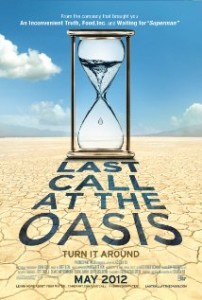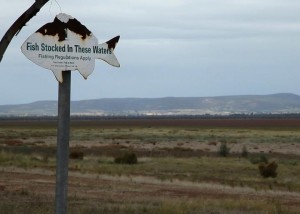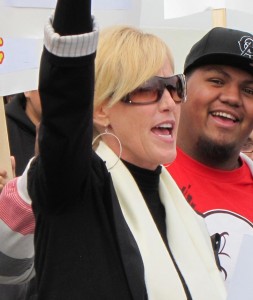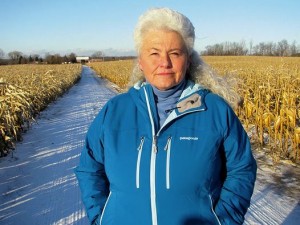 Adam Schartoff: How making “Last Call at The Oasis” from an editing standpoint? Not just cutting it, but as a filmmaker and storyteller?
Adam Schartoff: How making “Last Call at The Oasis” from an editing standpoint? Not just cutting it, but as a filmmaker and storyteller?
Yu: With this film, I wanted the big picture. I really wanted to understand how interconnected water is with issues like quality vs. quantity, and what did climate change and regulation has done. I wanted all of that. And knowing that was the scope of it I realized I needed to tell as much of that through stories, or else people would be overwhelmed with data. And so, that was the organizing principle in a lot of ways, the stories. It’s roughly divided into the issues of quantity, quality, and then there’s the last section: I actually like to think of it as more the psychology behind our inertia. You know, what does it take to move forward to the next step. So that was roughly how it was laid out. But as we started, we see that in these things there is a lot of overlap, in these larger headings- like terms of quality: if you pollute your water past a certain point, you have taken that water out your supply.
 Schartoff: What I’ve taken from this is that there’s really only one body of water, in a sense.
Schartoff: What I’ve taken from this is that there’s really only one body of water, in a sense.
Yu: Right, its one big lake.
Schartoff: And you know, you can pollute to an extent, but whatever pollutants you put in the water are going to find their way into your body.
Yu: The other thing that is shocking is how long those pollutants remain in the water. Chromium can remain in the water for 400 years, which is essentially forever.
Schartoff: It’s all very overwhelming. An expert in your film says, “we’re screwed.” How do we counter that mind frame? Should people take away from the film that Is that a lot of small steps that everybody takes? Or is it about the larger picture, like the legislative steps made by government? Or is it a combination of the two?
Yu: I think its all of the above. That’s a really good question, because I feel like either we tend to just completely deny or dismiss that there is a problem, right? So we don’t do anything. The other thing we do is that we get overwhelmed by how big it is- so we don’t do anything![laughs] So that’s what keeps the inertia where it is. So I think where we were getting at in the film is that everything helps, mainly because most of us aren’t doing anything. So the potential for progress is huge, but that progress could be on the personal level. I mean, it always sounds banal like: take shorter showers and something about your lawn, but you look at those efforts multiplied by many people over their lifetimes- that’s pretty huge. And of course, on the macro-level the idea that we should have better regulation. We should have water policies. We should have better technologies, we should price water appropriately- these are all things that can make a huge difference and that’s the idea. There is no silver bullet, there is silver buckshot. I like that idea, that there are many little things that add up to the impact.
 Schartoff: Yeah, with water if everybody had a way of gauging in their own homes what the capacity is and left out there, and how they are effecting it directly.
Schartoff: Yeah, with water if everybody had a way of gauging in their own homes what the capacity is and left out there, and how they are effecting it directly.
Yu: I have had a fantasy, like if I were king, I would turn off the water 5 minutes once a week, not enough to mess anybody up, but to remind people: if you didn’t have the water coming out of your tap, what might that be like? But of course politically you could never do that, but as long as we have this endless flow out of our taps, it’s an abstraction- that idea of shortage.
Schartoff: What if they knew that for those 5 minutes, the water coming out of their taps would be going to a country where there were absolutely no taps? Where people were lucky for those 5 minutes…
Yu: Well I don’t know. It’s hard to say. There may be some people who would probably resent that.
Schartoff: Very true. Aren’t those the people you need to reach?
Yu: Yes, absolutely.
Schartoff: And are they going to go the theater to see “Last Call”?
Yu: Let me tell you why I think that some people will: it would attract some people- and I say this because I am asked all the time. People want to know, what do I drink? What is safe to drink? It’s such a basic, visceral concern that people have- and of course it’s an important question, but with everything else that is happening with water and shortage and climate change and crap we are putting in our water, it’s not, in a way that’s like the entry question. There’s so much else that is, in some way, even more important. It’s easy to say, if you trust your tap water mostly. But I think that is part of it, that people just want to know, is my water safe? How do I tell? And I think one of the big points in the film is that you might think I don’t trust my tap water- I’ll drink bottled water. We know that there’s a big footprint involved with that, and among other things and it’s generally not any safer. And a lot of times it’s just tap water, but I think the point is that no one can opt out of the hydro-logic system. No one can say, I am just going to have this water, you can have the other water. Like moving to Canada, which is something I Googled when I was working on this film, that is not going to work either. You have contamination and pollution issues everywhere. And climate change is a game changer. I think once we accept in the biggest sense we are in this together, that that will be a big motivator for change. Not like one big ‘we are the world, this is what we are going to do’, but people feeling like it’s got to be on everyone’s priority list. Right now I don’t think it’s really registering.
Schartoff: Maybe it’s past the initial pivotal platform, or at least in the forefront of the global, national conversation. Because climate change has been a rare case where it actually reached that many people and shifted, made and impact. If anything, in the way people are thinking about it, maybe to some degree behaving through thinking and a realization of the truth.
Yu: Yeah, and you know one thing about an participating media which the one thing I thing is an advantage to water is that it is a tangible thing. Climate change is a thing that one day people will say: yeah, it’s okay and then another oh, I don’t know it is not so good- so I don’t know what this global warming thing is about. So people can debate this until the end of time, but water is something that if you pay attention is measurable, you can see the level of rain drops you can see lagoons at factory farms polluted, the algae blooms and there are either things that whether you believe the thing that is causing say, a certain water shortage to be climate change you can see it. And I think that is something that we were trying to do in the film by making water always a character, so wherever we were filming we tried to evoke the presence of where the water was in this environment- or where it was absent.
Schartoff: Does water work [indecipherable @ 9.37]?
Yu: It was funny, that for some reason, through almost all of production it rain. Even in the most drought-stricken places in the world the day we arrived it would rain. People were going, “Oh my god!” We thought it was us! We go to Vegas- it rained twice the year before- it rained right before we were out there, it was pretty funny.
Schartoff: It is. How did you come to work, did you purchase media contact you and your crew? Because it sounded more like it was a ‘work-for-hire’ in this case, for lack of another term.
Yu: Diane Wireman, who is the Head of Documentaries Purchase, I have know for a long time. We have always wanted to work on something together, so she told me that water was something they were considering. Of course, there were a couple of things that ran through my mind like, who would want to see a film about water? I was thinking of all the ways one could shoot water. Of course making it to film we collected a lot of images of fountains, of water and waterfalls, and we called it ‘water porn’. It was really there, that opportunity. The second thing I was thinking was, okay- if water is on the list of purchase priority, whatever is happening with water is probably worse than I would have expected. And so that was interesting to me because I immediately thought that there is the way we like to think about water as this pretty, endless resource- and then there is the way that we actually manage it. Or, fail to manage it. That disconnect immediately was interesting to me.
Schartoff: I had seen another documentary about water some years ago, which can remain anonymous, but it did actually my behavior for awhile. It’s almost as you mentioned before, the forces of coming at you. The denial, and just life as usual makes it so difficult. So I went out and I did buy a filter- a mini filter bottle- and just was using tap and fountains and all. And because I did learn that bottled water actually was less regulated than tap water, and also the impact on the ecological level of the plastic bottle contributing, you see the bottle’s plastic inside the aquatic life. It’s very, very sad and tragic. It did actually impact over the course of weeks, days, months, and even though it was conscious. The most depressing part is seeing bottles of water lined up in a year.
Yu: You’d be surprised how many places I have gone to speak or attend things, and there is a bottle of water up there. And at the last minute people will scramble, but you know it’s just for that day. Right? In the end its gotta become so much, it’s gotta tip.
Schartoff: It’s scary how much, and whether there is time to effectively do that .
Yu: Right, I mean that was actually the most shocking thing to me: the short time frame in which things are declining, disappearing, where business as usual can end in places like central California.
Schartoff: Sure, and so with [indecipherable-participant?] media, had you thought of doing a film along the lines of a reductive film, or an advocacy film- the kind of the category of the film. Had you considered yourself a filmmaker of that style prior?
 Yu: I feel like if you’re making a true, if you’re making a strictly advocacy film you should be an activist.
Yu: I feel like if you’re making a true, if you’re making a strictly advocacy film you should be an activist.
Schartoff: I was going to ask you if you considered yourself an activist filmmaker.
Yu: Definitely a filmmaker first- and really I couldn’t think of any other way. I think it was more the challenges. There’s a certain fundamental set of knowledge that you need to be able to figure out what the stakes are, what is the context for what’s happening, so we knew that we had this basic information we had to get across in the film. And it’s complicated, and that’s why we wanted to tell through stories. The other thing is that people, we think, are logical. You present people the facts, they make the right decisions-whatever that is, but of course we are emotional. There have been studies recently about how people make their decisions, and it is much more emotionally- based. I feel that unless we can see what is happening to people on the ground, people that we can connect with, it doesn’t really sink in. That was , without over analyzing it, the basic approach. Because I think unless people feel invested ,unless there is some visceral understanding of what the stakes are…
Schartoff: Our children’s health.
Yu: Right!
Schartoff: I was glad it didn’t go too far like that, because that is kind of far .
Yu: How old are your kids?
Schartoff: I have an eight year old son.
Yu: I have two girls, seven and ten.
What was funny with this film was what I was thinking of calling it A River in Egypt, but then I realized that denial is actually the willful dismissal of evidence presented to you. But is not even on our radar.
Schartoff: It’s not really apt, what is going on. It’s more ignorance in the purest definition, religious in a sense when you are brought up basically thinking that the idea- still- that bottled water is cleaner, because that’s marketing. It’s millions of dollars of marketing wanting people to have that you’re fighting against.
Yu: It is tough I think. That’s the thing I was really struck by, the scientists we have in the film. Because these are people who have been working on these issues for years and years and years, and all of a sudden we are seeing writing on the walls. It’s like crying “Fire!” in a quiet theater. And one guy said “You know, we are just not very good at it. We didn’t go to school for this.” And then you mentioned the example of bottled water marketing. You have lots of money and bright minds working on that side, and that’s why they do. And you think of these scientists trying to get their messages across with their papers and press conferences and stuff. I mean, it such an uphill battle.
Schartoff: But getting Jack Black, and coming from that idea of reducing that whole psychological conversation was very interesting. For me that was the most interesting part of the movie. Just personally, in terms of the cockroach in the glass issue and getting that sort of approach with the bottle, and humor, and recognition, and trust. The trust factor. I was thinking along the lines of if Coke, one of the bigger bottlers of water with Dasani. that if they were to put out a line and put their Coke behind it, of recycled water that it would have a large following because people trust the brand so much. So much more loyalty than any other company.
Yu: It was kind of tricky because we were trying to not suggest that it should be treated as a bottled water product, but it did have all the advantages of bottled water as it is marketed, but I was fascinated by that idea too. What does it take to make people change behaviors? People need to be wooed; you cant just say this, and this, and this, and wag your finger at them.
Schartoff: Yeah, that’s not going to work.
Yu: And I think that’s where you see sometimes what we were talking about with advocacy- whether it’s through film, books, or whatever. People can get turned off.
Schartoff: Very easily, and there’s a lot of those obviously. And you’re setting yourself up as an argument for the opposition- I don’t know how anybody would be opposed to a water problem that exists, but that-
Yu: Oh your so naive [laughs]
Schartoff: I figure there there are going to be those who say that the climate issues are a result of hysteria- but especially with humor behind it. I think you’re actually not going to use the fear tactic because I think that it does just drive people away, or it alienates people. The film has it’s share of humor.
Yu: I think that’s why we were trying to diffuse, unexpectedly, the idea of the next water wars are going to be fought over. Water! Because I think that that kind of hyperbole is, not to say that water does not add to the intensity of conflict, but it makes people feel like, well that’s what would happen- hopelessness, right?
Schartoff: Or the scientists will figure out a way, like: “Get it from the moon!” Can you just tell me what is the next step with the film?
Yu: So being released in New York and Los Angeles on Friday, and the following week it’s in San Francisco and DC, and then the following week they are doing… the tiered platforms.
Schartoff: Theatrically, where is playing in New York City?
Yu: It’s at two theaters here, and in LA it’s at the Landmark.
Schartoff: Well, we have a Landmark here. Maybe it’s playing at that Landmark. Where are you from?
Yu: Los Angeles.
Schartoff: You are from Los Angeles. Are there any plans terms of the distribution plan?
Yu: I don’t know, they are probably going to see how far they can roll out the theatrical and that kind of stuff.
Schartoff: That makes sense.
Yu: You see, that’s not my area of expertise.
Schartoff: It shouldn’t be! But what’s next for you, anyway?
Yu: A couple of projects, a couple of [participants]. We are going to look at population next.
Schartoff: That goes hand in hand with the other issue.
Yu: Yes, everything came back to population.

